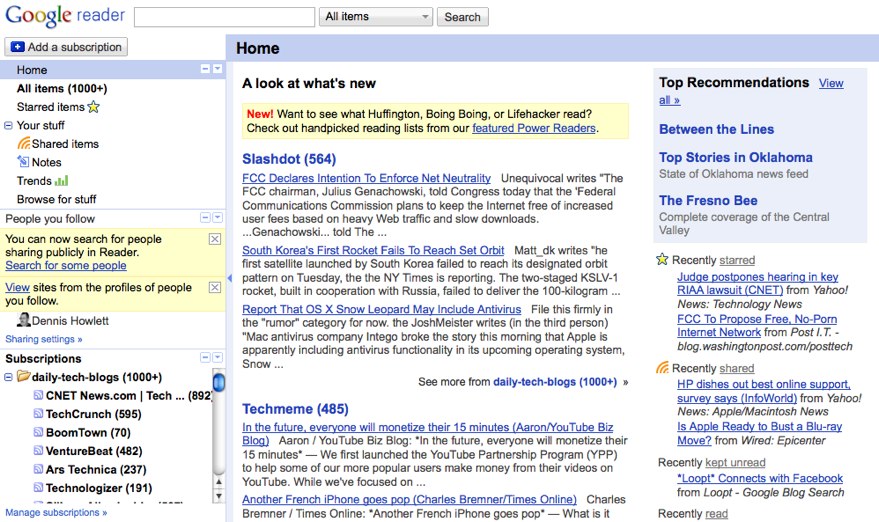RSS: A good idea at the time but there are better ways now

The Google Reader team posted a blog entry today with some results of a survey it conducted. The team wanted to know what an elite group of "Power Readers" were reading online - presumably using their Google Reader account - and so they asked them and have highlighted some suggested reading on the site.
It's an interesting little post for those who are interested in these power readers and what interests them - but what struck me was the attempt that company made to bring get people interested in Google Reader again.
Once a big advocate for Google Reader, I have to admit that I haven't logged in in weeks, maybe months. That's not to say I'm not reading. Sometimes I feel like reading - and writing this blog - are the only things I do. But my sources of for reading material are scattered across the Web, not in one aggregated spot.
I catch headlines on Yahoo News and Google News. I have a pretty extensive lineup of browser bookmarks to take me to sites that I scan throughout the day. Techmeme is always in one of my browser tabs so I can keep a pulse on what others in my industry are talking about. And then there are Twitter and Facebook. I actually pick up a lot of interesting reading material from people I'm following on Twitter and some friends on Facebook, with some of it becoming fodder for blog posts here. 
The truth of the matter is that RSS readers are a Web 1.0 tool, an aggregator of news headlines that never really caught on with the mainstream the way Twitter and Facebook have. According to a Forrester Research study about the reach of social technologies, only nine percent of U.S. online adults said they use an RSS feed monthly, down from 11 percent the year before. By contrast, 50 percent are visiting social networking sites, up from 34 percent last year and 39 percent are reading blogs, up from 37 percent a year ago.
The official name for RSS was Really Simple Syndication but for the many people, including those I helped set up with an RSS reader, it never really was that simple. It wasn't that it just needed to be populated with subscriptions to what you wanted to read, but then came the task of keeping it organized, otherwise your local headlines were mixed with last night's baseball scores, which was alongside political news and off-color commentary.
It all became too much - especially when you log on and see that you have 1,000+ unread items. Sigh. Who has time to sift through all of that?
And so, Google is doing what it can to keep people interested in what they can do with Google Reader. I can't speak for others, but I moved on a long time ago.